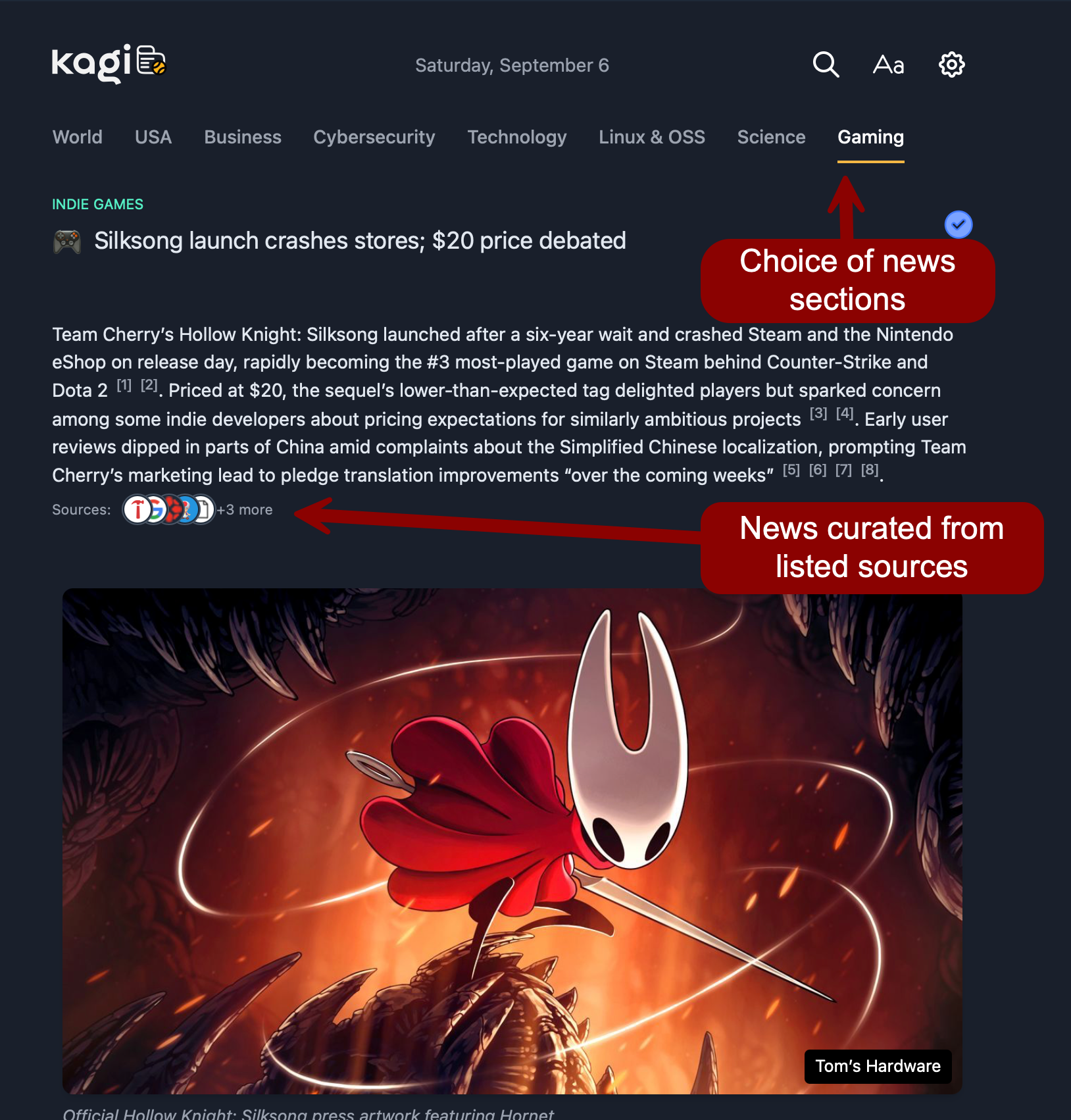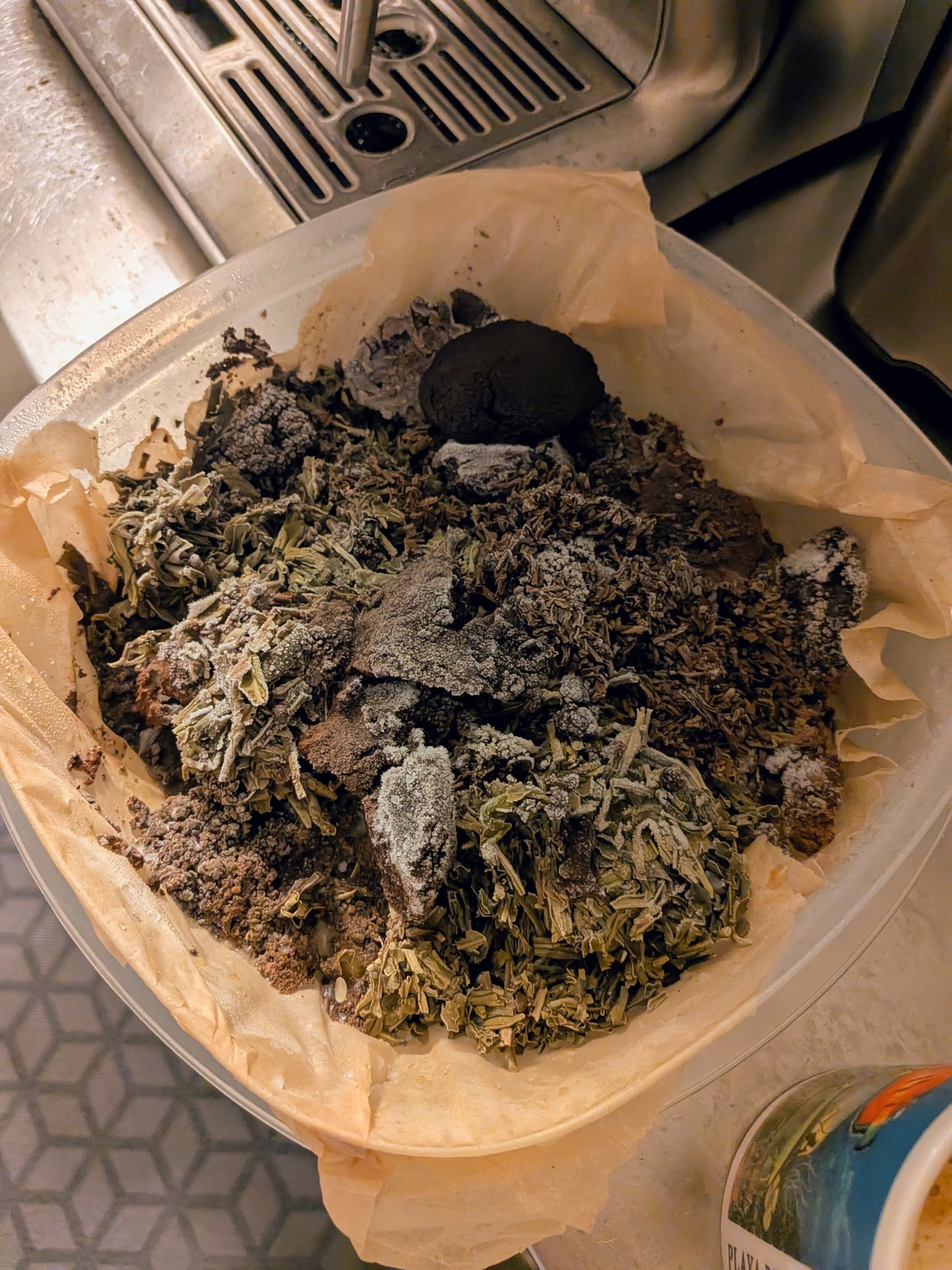My KVM switch died -- recommendations?
Well, it looks like my KVM switch finally died. Before I rush-purchase a new one, I was wondering if anyone has a recommendation for one, or for a different solution altogether?
Do you like blogs? Have you checked Kagi Small Web?
Yes, I’m talking about Kagi again. But this one is a free service, and if you like individual blogs (or think the small web is dead) you should check it out.
On a trip to Connecticut last weekend, we saw plenty of mushrooms 🍄 and a few frogs 🐸. 📷



In Criticism of Kagi news
Yesterday, I posted about the new Kagi news and shared it with Nat. Nat is very skeptical about AI in general, and reminded me of the main problem he has with AI technologies like this one: the authors get no credit. In this case, the writers of the news articles who are used in the summaries have no idea, and probably get nothing in terms of profit, when I read these articles.
Even if I only read a small portion of the article (the summaries are small, only a paragraph or so) and each summary is made of a mix of many articles, the problem remains. Makes me wonder if there’s a better way to handle this…?
Kagi news looks really good, and I appreciate their principle of updating the news only once a day.
The news section is a “stream” of titles that expand when you select one into a short blurb (another core principal of theirs is that they need to take five minutes to read, no more) for more information. Each one of those “nuggets” of information is curated from several sources, which are all listed at the end of the article. I’m guessing the text is AI-generated, so some sentences may feel a bit odd, but nothing too bad.

On my way for a walk in the afternoon, met a neighbor from a nearby yard.
And for my next Synolog DRM adventure, I decided to… not really adventuring. I’ve been thinking of setting up Owndrive, from there went towards Nextdrive, and after reading a few opinions in general, I landed on Kevin’s review of both. As usual, it resulted in a head nod and a silent agreement.
FreshRSS is up. Kinda.
My FreshRSS server is up. Mostly. With some hiccups. And boy, do I have more appreciation for LLMs now. I’ll expand some more sometime soon, it’s late, I need to sleep…
There Will Be Blood, 2007 - ★★★

It's not a bad movie, but I didn't finish it. It's unsettling to watch Daniel Plainview, played by Daniel Michael, destroying himself piece by piece. I might come back to it at another point when I'm in the right mood.
Didn’t sleep well last night, but I’m kind of grateful for that because I managed to fix my Docker FreshRSS container and now I’m getting RSS feeds to Elfeed again. So much explaining to do…
Been trying to get FreshRSS working with Elfeed. Kimi (Kagi’s recommended LLM for Assistant) was very helpful, and I got it running on Docker correctly. But between setting up an API and accessing it from a browser and telling Elfeed where it is… Yeesh, it seems really complicated.
The Big Lebowski, 1998 - ★★★½

Every time I watch this movie, I pick up some other meanings I didn't before. Sometimes you just need to shrug it off and go bowling.
I spent the majority of my morning panicking about something that will blow in my face on Tuesday and getting no assistance, and the rest of the morning working out favors from different people so I can do it myself tomorrow. How’s your Friday been?
A quick rundown about how I write instructions in org-mode
A quick (kind of?) rundown of my processes to write technical documentation in org-mode.
We drink a lot of coffee ☕️. It adds up. And tea 🫖 also.

Checking a YouTube video about Docker (for my Synology, where it’s called Container). Everything today is Docker this Docker that. Turns out it’s kind of like a VM, so I kind of get it. Trying to figure out how to tell the actual path in the YAML file from those virtual ones for configs like timezones, etc.
It seems Emacs breaks several HTML links in org-mode when converting to markdown. I had to go back in there and remove those code snippets and re-add them. Need to find an option that tells Emacs, “if you see something in HTML inside this org-mode buffer, don’t touch it.”
AI hallucinations and creativity
AI hallucinations are not necessarily bad, just like AI in general. The key, as always, is how we use it and to what ends.
Overinformation
I’m bugging out from all the information about vegan food I found. Too much too fast. But this is how I roll.
One thing I’m realizing as I transition to vegan foods is the need to cook more often. 🥗
Most restaurants don’t have a lot of vegan options (even here in NYC, it’s kind of an “add-on” section on the menu, and dedicated vegan restaurants close down all the time), and vegan groceries are usually super-duper processed.
Looks like I’ll need to get over my fear of food processors and blenders. But at the same time, a mental note for myself that everything takes time, and I won’t just “learn kung fu”. It’s a life thing, not a week thing.
